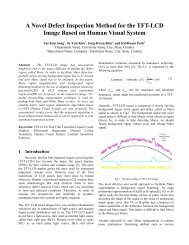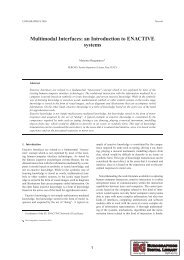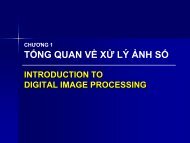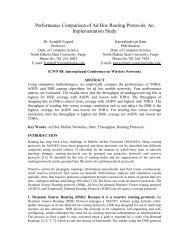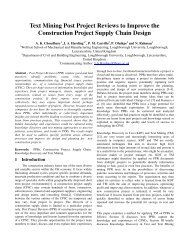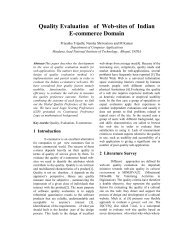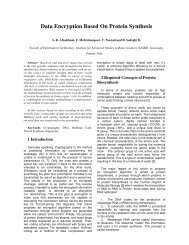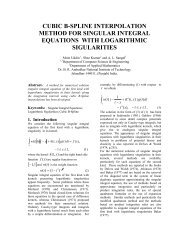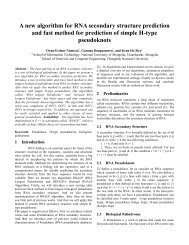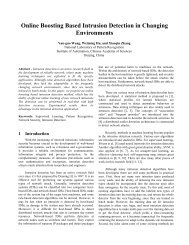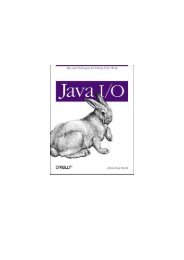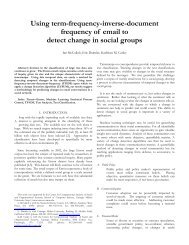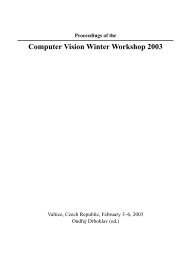O'Reilly - Java Message Service
O'Reilly - Java Message Service
O'Reilly - Java Message Service
You also want an ePaper? Increase the reach of your titles
YUMPU automatically turns print PDFs into web optimized ePapers that Google loves.
3.4.5 Stream<strong>Message</strong><br />
<strong>Java</strong> <strong>Message</strong> <strong>Service</strong><br />
The Stream<strong>Message</strong> carries a stream of primitive <strong>Java</strong> types (int, double, char, etc.) as its<br />
payload. It provides a set of convenience methods for mapping a formatted stream of bytes<br />
to <strong>Java</strong> primitives. Primitive types are read from the <strong>Message</strong> in the same order they were<br />
written. Here's the definition of the Stream<strong>Message</strong> interface:<br />
public interface Stream<strong>Message</strong> extends <strong>Message</strong> {<br />
}<br />
public boolean readBoolean( ) throws JMSException;<br />
public void writeBoolean(boolean value) throws JMSException;<br />
public byte readByte( ) throws JMSException;<br />
public int readBytes(byte[] value) throws JMSException;<br />
public void writeByte(byte value) throws JMSException;<br />
public void writeBytes(byte[] value) throws JMSException;<br />
public void writeBytes(byte[] value, int offset, int length)<br />
throws JMSException;<br />
public short readShort( ) throws JMSException;<br />
public void writeShort(short value) throws JMSException;<br />
public char readChar( ) throws JMSException;<br />
public void writeChar(char value) throws JMSException;<br />
public int readInt( ) throws JMSException;<br />
public void writeInt(int value) throws JMSException;<br />
public long readLong( ) throws JMSException;<br />
public void writeLong(long value) throws JMSException;<br />
public float readFloat( ) throws JMSException;<br />
public void writeFloat(float value) throws JMSException;<br />
public double readDouble( ) throws JMSException;<br />
public void writeDouble(double value) throws JMSException;<br />
public String readString( ) throws JMSException;<br />
public void writeString(String value) throws JMSException;<br />
public Object readObject( ) throws JMSException;<br />
public void writeObject(Object value) throws JMSException;<br />
public void reset( ) throws JMSException;<br />
On the surface, the Stream<strong>Message</strong> strongly resembles the Bytes<strong>Message</strong>, but they are not<br />
the same. The Stream<strong>Message</strong> keeps track of the order and types of primitives written to the<br />
stream, so formal conversion rules apply. For example, an exception would be thrown if<br />
you tried to read a long value as a short:<br />
Stream<strong>Message</strong> stream<strong>Message</strong> = session.createStream<strong>Message</strong>( );<br />
stream<strong>Message</strong>.writeLong(2938302);<br />
// The next line throws a JMSException<br />
short value = stream<strong>Message</strong>.readShort( );<br />
While this would work fine with a Bytes<strong>Message</strong>, it won't work with a Stream<strong>Message</strong>. A<br />
Bytes<strong>Message</strong> would write the long as 64 bits (8 bytes) of raw data, so that you could later<br />
read some of the data as a short, which is only 16 bits (the first 2 bytes of the long). The<br />
Stream<strong>Message</strong>, on the other hand, writes the type information as well as the value of the<br />
long primitive, and enforces a strict set of conversion rules that prevent reading the long as<br />
a short.<br />
47



